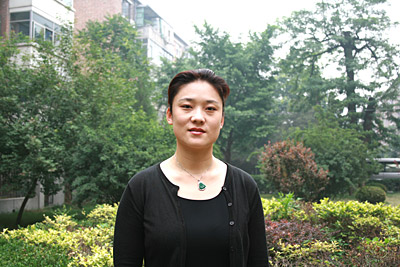
The winner of seven table tennis world champion titles, with a career-best world ranking of No.3, Liu Wei retired from the Chinese national team in 1996 after losing the women's doubles final at the Atlanta Olympics. With less pressure and attention from the public and the media, she shifted careers smoothly and proficiently, from that of a professional player to a university student and then a businesswoman.
Presently the General Manager of Peking University Founder Table Tennis Club, Liu Wei shares her experiences and views on the sport of table tennis and the coming Olympics in an exclusive interview with Beijing Review reporter Chen Ran.
Beijing Review: You have won seven championship titles, domestic and international, during your thirteen-year-long professional career. Which match impressed you the most?
Liu Wei: The women's doubles final at the Atlanta Olympics in 1996. My partner Qiao Yunping and I were defeated 3-1 by our teammates Deng Yaping and Qiao Hong. It is actually my lifelong regret that I haven't won an Olympic gold medal although I have seven world championship titles under my belt. A "winner" in the Chinese national table tennis team is a gold medalist. It is the ultimate goal of every player to get a gold medal. But a silver medalist is a "loser".
You were a registered player at the Sakura Bank Club in Japan from 1996 to 1999. Did this experience abroad have any influence on your life afterwards, and on your current job?
It was helpful by and large. I got an offer from Japan's prestigious Waseda University, where I could study and play table tennis simultaneously. But the longer I stayed in Japan the more I realized I should return to China, where my heart and soul is rooted. I love table tennis and played it for some twenty years, but it is still only a part of my life, not my entire life. That is why I chose to get my bachelor's degree at China's Peking University.
My working experience in Japan gave me a better understanding of the management and operation of table tennis clubs there. In addition, I did a lot of research work on the NBA and several European football clubs. There's a closer relationship between sports and marketing abroad, in my opinion, than in China; the promotion of sporting events there is more successful, and the degree of market standardization is higher as well.
Currently, when it comes to table tennis in China, there is much that can be done to better develop the clubs and the market. Table tennis, also known as ping-pong, has been regarded as the Chinese national ball-game for a long time; we have the most number of ping-pong players in the world. But the marketing of this sport, however, has been weak and far from satisfying. The main reason for this, in my opinion, comes from the absence of a team that has a clear understanding of how to operate events professionally on a macro level. For example, the allocation of market revenue becomes a problem when a contradiction between existing management system and marketing occurs. Judging from a marketing perspective, the revenue should flow to the clubs. Judging from a management perspective, however, there will be the risk of losing control if the revenue gets allocated openly. This is the most pressing dilemma that the sports market in China faces.
In 1999, you became a university student. What impressed you most about Peking University?
I noticed that there were three kinds of students in the university: students who came from the traditional education mode and entered the university via the national university entrance examination; students from the traditional sports training mode, who were retired professional players (usually world champions), and entered the university via preferential policy; students with specialties in disciplines such as the arts, sports, sciences, etc., who also entered the university via national university entrance examination.
Personally, I belonged to the second category of student. The life of the third category of student, judging from a more humane perspective, was a combination of advantages from the first two kinds, so it was far more interesting and colorful.
Is this the reason you initiated the Peking University Founder Table Tennis Club in 2003, after your bachelor's degree? As the general manager, how do you manage to combine Peking University (education) and the Founder Group (an affiliate of the Peking University) with table tennis (sports)?
The root idea of setting up a club comes from my fondness of table tennis. I just tried to explore a new model that can combine sports training with schooling. The difference between the new model of sports training and the traditional one is plain to see. Traditionally, a national team player follows a route like this: local amateur sports team -- provincial/municipal professional sports team -- youth national team -- national team. The predominant advantage of such a model is high professionalism; it helps to push the boundaries of sports. Personally, I'm grateful for this model, otherwise I wouldn't be who I am today.
